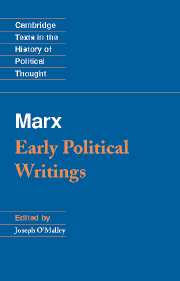Book contents
- Frontmatter
- Contents
- Acknowledgements
- Editor's Introduction
- Chronology of Marx's Life and Career, 1818–1848
- Bibliography
- Editor's and Translator's Note
- From the Critique of Hegel's Philosophy of Right (§§261–313)
- ‘On the Jewish Question’
- ‘A Contribution to the Critique of Hegel's Philosophy of Right: Introduction’
- From the Paris Notebooks
- ‘Critical Marginal Notes on “The King of Prussia and Social Reform. By a Prussian”’
- Points on the State and Bourgeois Society
- ‘On Feuerbach’
- From ‘The German Ideology’: Chapter One, ‘Feuerbach’.
- From Poverty of Philosophy
- Address on Poland
- Index
- Cambridge Texts in the History of Political Thought
From the Critique of Hegel's Philosophy of Right (§§261–313)
Published online by Cambridge University Press: 05 June 2012
- Frontmatter
- Contents
- Acknowledgements
- Editor's Introduction
- Chronology of Marx's Life and Career, 1818–1848
- Bibliography
- Editor's and Translator's Note
- From the Critique of Hegel's Philosophy of Right (§§261–313)
- ‘On the Jewish Question’
- ‘A Contribution to the Critique of Hegel's Philosophy of Right: Introduction’
- From the Paris Notebooks
- ‘Critical Marginal Notes on “The King of Prussia and Social Reform. By a Prussian”’
- Points on the State and Bourgeois Society
- ‘On Feuerbach’
- From ‘The German Ideology’: Chapter One, ‘Feuerbach’.
- From Poverty of Philosophy
- Address on Poland
- Index
- Cambridge Texts in the History of Political Thought
Summary
[Hegel's Mystification of the State]
[In §262 of The Philosophy of Right Hegel says that] the manner and means of the state's mediation with the family and civil society are ‘circumstances, arbitrary will, and personal choice of vocation’. Accordingly, the rationality of the state has nothing to do with the division of the material of the state into family and civil society. The state results from them in an unconscious and arbitrary way. Family and civil society appear as the dark natural ground from which the light of the state emerges. ‘Material of the state’ here means the business of the state, i.e. family and civil society, in so far as they constitute components of the state and, as such, participate in the state.
This development is remarkable in two respects.
(1) Family and civil society are conceived of as spheres of the concept of the state, specifically as spheres of its finiteness, as its finiteness. It is the state which divides itself, which presupposes them, and indeed does this only in order to emerge from its ideality and become infinite and actual spirit for itself … The so-called ‘actual Idea’ (spirit as infinite, actual) is described as though it acted according to a determinate principle and toward a determinate end. It divides itself into finite spheres, and it does this ‘in order to return to itself, to be for itself’, and it does this such that things turn out exactly as they are.
Here [Hegel's] logical, pantheistic mysticism is clearly evident.
- Type
- Chapter
- Information
- Marx: Early Political Writings , pp. 1 - 27Publisher: Cambridge University PressPrint publication year: 1994
- 1
- Cited by



